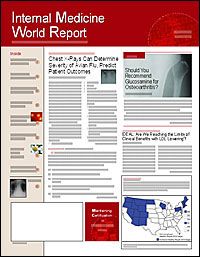Publication
Article
Internal Medicine World Report
First-in-Its-Class Agent Approved for RA
Abatacept (Orencia; Bristol-Myers Squibb) injection, a novel selective modulator of a co-stimulatory signal required for full T-cell activation, has been ?ap?p?roved for adults with moderately to severely active rheumatoid arthritis (RA) who have not responded to >=1 ?disease-mo?????di?fying antirheumatic drugs (DMARD). Abatacept can be used as monotherapy or with DMARDs but should not be combined with tumor necrosis factor antagonists or anakinra. Side effects include headache, upper respiratory tract infection, nasopharyngitis, and nausea (www.bms.com).
Orally Disintegrating Formulation of Citalopram
The FDA has approved an orally disintegrating tablet version of citalopram (Citalopram ODT; Biovail Corpor?ation) in 10-, 20-, and 40-mg tablets. The selective serotonin reuptake inhibitor anti?depressant has been marketed under the brand name Celexa by various companies. The new formulation may be use?ful for patients who have difficulty swallowing tablets or who do not always have access to water (www.biovail.com).
Cryotherapy for Removal of Breast Fibroadenomas
A new indication for the treatment of breast fibroadenoma has been approved for a cryotherapy system that is already used for the treatment of prostate, kidney, and liver cancer (CryoHit; Galil Medical). Cryotherapy does not cause sc?ar?ring and can be performed as an outpatient ?pro?cedure (www.galilmedical.com).
NeutroSpec Pulled from Market
The FDA has issued an alert that the diagnostic imaging agent technetium (Tc 99m) fanolesomab (NeutroSpec; Palatin Technologies) is being withdrawn from the market pending review of ?postmarketing reports of serious adverse events, including deaths, associated with its use. Physicians are being told to stop using the radiolabeled antibody and to contact the manufacturer about ?returning any unused product (www.palatin.com).
New Procedure for Lumbar Spine Stenosis
The FDA has approved an interspinous process decompression system (X Stop; St. Francis Medical Techno?logies) for the treatment of the neurol?ogic intermittent claudication caused by lumbar spine stenosis. The first-of-its-kind technique, which avoids the risks associated with laminectomy, is indicated for adults aged 50 years who have com?p?l??e??ted at least 6 months of ?conservative treatment. Under local ?anesthesia, the titanium alloy device is implanted between spinous processes to limit extension of the lumbar spine and relieve associated pain (www.sfmt.com).
First Test for WNV Screening in Blood Donors
The first blood test has been approved for screening donors of blood, organs, cells, and tissues for West Nile virus (WNV). The Procleix WNV Assay (GenProbe/Chiron) detects viral genetic material (ie, ribonucleic acid). To date, of the 30 documented cases of WNV acquired from a blood transfusion, 9 patients died (www.fda.gov).
FDA Holds Open Meeting to Address Clinical Trial Outcomes
The FDA has announced an open registration meeting, to be held on February 23-25, 2006, in Chantilly, Va, to discuss the FDA's recently issued draft guidance document on patient-reported outcomes in clinical trials. The meeting, which is being cosponsored by the Mayo Clinic and the FDA's Center for Drug Evaluation and Research, is intended to serve as a forum for open and inclusive discussions of the guidance document. Teams formed at the meeting will then revise the draft document to incorporate the issues addressed at the meeting and submit them to the FDA for consideration in preparing their final guidance document. Physicians who wish to register for the meeting should call 800-323-2688 or visit www.mayo.edu.
FDA Warned 9 Companies Touting Bird Flu Remedies
The FDA has issued warning letters to 9 companies marketing products claiming to be effective against the avian influenza or other forms of influenza; 8 were purportedly dietary supplements. The FDA is not aware of any scientific evidence that demonstrates the safety or efficacy of these products for treating or preventing avian flu. "There are initiatives in place to deter counterfeiters and those who sell fraudulent or phony products to prevent or treat avian flu," said Andrew von Eschenbach, MD, acting FDA commissioner. "The use of un?proven flu cures and treatments increases the risk of catching and spreading the flu rather than lessening it, because people assume they are protected and safe, and they aren't. I consider it a public health hazard when people are lured into using bogus treatments based on deceptive or fraudulent medical claims" (www.fda.gov).






